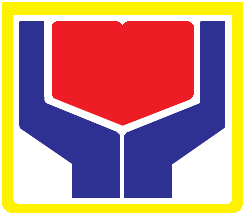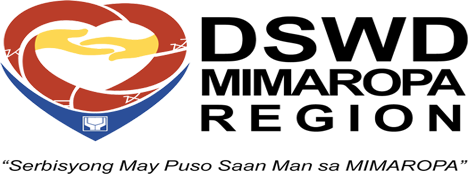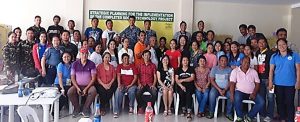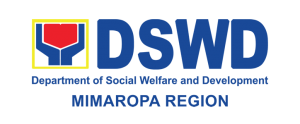MALATE, Manila – Department of Social Welfare and Development (DSWD) MIMAROPA, in cooperation with Local Government Unit of Abra De Ilog, Occidental Mindoro, intensified the ‘anti-drug’ advocacy campaign of the government by organizing a three-day Strategic Planning for the Implementation of Completed Social Technology Project on Family Drug Abuse Prevention Program (FDAPP) last April 25 to 27, 2017.
Strategic Planning aims to: 1) Better understand the context of the drug addiction problem in Abra De Ilog; 2) Cultivate a deeper understanding of FDAPP and develop a logical Framework for the municipality; and 3) Identify project implementation activities and clarify roles and responsibilities of participants.
Workshop seminar was participated by Barangay Officials from nine (9) barangays in Abra De Ilog, Occidental Mindoro: Amado, Balao, Cabacao, Poblacion, Lumang Bayan, Wawa, San Vicente, Tibag and Udala.
Family Drug Abuse Prevention Program
Family Drug Abuse Prevention Program is a community based prevention program to educate and prepare families and their members as well as the communities regarding the adverse effects of drug abuse.
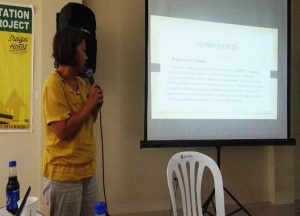
“Family, as the basic unit of the Filipino society, has a significant role in the education and awareness on the ill effects of dangerous drugs,” highlights Josephine B. Macalagay, Social Technology Unit Head of DSWD MIMAROPA during her orientation on ‘Guidelines in the Implementation of FDAPP’.
FDAPP further aims to equip the families with parenting and life skills towards a drug free home.
Primarily, FDAPP is based on RA 9165 “Dangerous Drugs Act of 2002” Section 41, Article IV which states the involvement of the family and tasked it to be primarily responsible for education and awareness on Drug Abuse Prevention.
Components of FDAPP
In order to ensure effective implementation of the program, there are four (4) main strategic components of FDAPP: 1) Organization of Families or transformation of families into family councils who will conduct drug abuse prevention activities within their groups/communities based on their needs; 2) Capacity Building which includes conduct of training activities such as life skills, leaders training, peer counselling and values education; 3) Advocacy and Social Mobilization such as dialogue sharing among parents and children, symposium, and lecture discussion which may heighten support and awareness in the implementation of FDAPP; and 4) Networking and Alliance Building which involves collaboration and cooperation with existing anti-drug abuse councils, government, non-government organizations, parents/youth organizations’ on raising awareness of drug abuse prevention issues that would affect the families and community.
Macalagay, during her orientation, explains, “We will conduct these strategic components of FDAP in order to ensure successful implementation of the program. For now, we are conducting strategic planning in order to better understand the context of drug addiction problem in Abra De Ilog and to develop logical framework for the FDAPP of the province.”
Convergence on War on Drugs
Collaboration and convergence of various National Government Agencies (NGAs), Local Government Units (LGUs), Non-Government Organizations (NGOs) and other concerned entities made the workshop seminar more extensive and meaningful.
Philippine Drug Enforcement Agency (PDEA) MIMAROPA Representative Grace D. Lano discussed the ‘National and Regional Situationer of the Drug Trafficking in the Whole World’ and how the PDEA worked for this problem. While, Abra De Ilog Chief of Police Roel Gabito conferred the ‘Project Double Barrel’ and Barangay Drug-Cleaning Operation ‘Oplan Tokhang’ in the municipality.
On the other hand, Rowena Espiloy from the Dangerous Drugs Board (DDB) lectured on ‘Preventing Drug Addiction among Children and Adolescent’.
With the lectures provided, Emmanuelle M. Protasio, main facilitator of the activity, guided the participants in crafting a concrete and strategic drug prevention plan for their respective barangays.
At the end of the workshop seminar, Abra De Ilog Mayor Ma. Gloria M. Constantino and Vice Mayor Orlando Quito, together with barangay officials, committed to support and implement the Family Drug Abuse Prevention Program and exert their utmost effort to make Abra De Ilog a drug-free home for their constituents.
The National Drug Rehabilitation Program of the government has three pillars. Pillar I refers to the creation of a data base of drug surrenderers, Pillar II is the community-based rehabilitation pillar, while Pillar III refers to the aftercare, reintegration, and transformation support for recovering drug dependents. The DSWD, as mandated by President Rodrigo R. Duterte, is one of the lead agencies for Pillar II and Pillar III.
-###-
![]()
